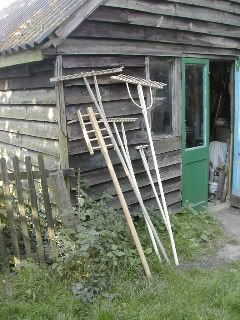It is a common misconception that crafts die out when they become outdated and uneconomic in the modern world. The reality is always more complex and I want to share an example to show what typically happens when an old craft finally dies.
Simple wooden hay rakes have been a part of British life for 1000 years or more.
Trevor Austen ran a rake workshop at Smeeth in Kent . The earliest record of the rake workshop there is 1871 and it had been in continuous production since. What made Trevor unique was that he was the last commercial rakemaker who was using locally sourced timber. He used coppiced ash for all parts of the rakes and cut the trees up and made all parts of the rakes in a one man business.

Trevor took over the business and saved it from closing in 1966. He has seen the ups and downs typical of many a rural craft over the years but kept going. I used to demonstrate out at craft shows with him where he would make rakes and sell them direct to the public, he could make 100 a week which is impressive. He had more recently been exporting rakes to the USA, Germany and Japan, it was a viable business working without any subsidy, contributing to the economy, but not strong enough to take on staff, train apprentices and expand.
Trevor had hoped to continue working as long as possible and finally to attempt to pass the business on as a going concern but sadly after several years of illness Trevor was diagnosed with MS. Whilst there is no support network for rare craft businesses when they are running there is money to record them when they close down so two short films have been made of Trevor's rake workshop one by the Museum of English Rural life is online here http://www.reading.ac.uk/merl/online_exhibitions/ruralcrafts/thefilms/hayrakemaker.html
I have been corresponding with Trevor over the last few weeks about what happened to the workshop, he said
"our machinery is finding new homes with people who will use it at shows etc, hand tools are finding homes for use when barters are offered , a few pieces will enter a local museum.
Little room was left for us to maneuver into saving it (other than for others to pick the bones clean) then to try an break it all up giving my family a bit of money for their efforts, little that it will bring."
It seems sad to me that this viable business should close its doors at a time when many folk would love to work in such a fulfilling job. There are many more businesses like this that will go in the next 10 years. More info and pics on my blog here http://greenwood-carving.blogspot.com/

Simple wooden hay rakes have been a part of British life for 1000 years or more.
Trevor Austen ran a rake workshop at Smeeth in Kent . The earliest record of the rake workshop there is 1871 and it had been in continuous production since. What made Trevor unique was that he was the last commercial rakemaker who was using locally sourced timber. He used coppiced ash for all parts of the rakes and cut the trees up and made all parts of the rakes in a one man business.

Trevor took over the business and saved it from closing in 1966. He has seen the ups and downs typical of many a rural craft over the years but kept going. I used to demonstrate out at craft shows with him where he would make rakes and sell them direct to the public, he could make 100 a week which is impressive. He had more recently been exporting rakes to the USA, Germany and Japan, it was a viable business working without any subsidy, contributing to the economy, but not strong enough to take on staff, train apprentices and expand.
Trevor had hoped to continue working as long as possible and finally to attempt to pass the business on as a going concern but sadly after several years of illness Trevor was diagnosed with MS. Whilst there is no support network for rare craft businesses when they are running there is money to record them when they close down so two short films have been made of Trevor's rake workshop one by the Museum of English Rural life is online here http://www.reading.ac.uk/merl/online_exhibitions/ruralcrafts/thefilms/hayrakemaker.html
I have been corresponding with Trevor over the last few weeks about what happened to the workshop, he said
"our machinery is finding new homes with people who will use it at shows etc, hand tools are finding homes for use when barters are offered , a few pieces will enter a local museum.
Little room was left for us to maneuver into saving it (other than for others to pick the bones clean) then to try an break it all up giving my family a bit of money for their efforts, little that it will bring."
It seems sad to me that this viable business should close its doors at a time when many folk would love to work in such a fulfilling job. There are many more businesses like this that will go in the next 10 years. More info and pics on my blog here http://greenwood-carving.blogspot.com/

